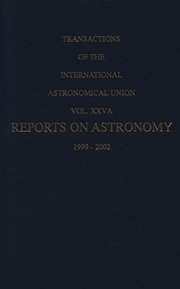No CrossRef data available.
Article contents
Third-World Astronomy Network
Published online by Cambridge University Press: 25 April 2016
Abstract
Several developing countries of the Third World have been actively interested in astronomy, as is evidenced by the membership of the IAU. The enthusiasm of individual astronomers from these countries is, however, not matched by the resources available to them to pursue their interest in astronomy, in teaching as well as research, at an above-threshold level. Major problems requiring solutions are (i) isolation from the mainstream work, which leads to research work which is not quite relevant or realistic, and to teaching based on outdated knowledge; (ii) lack of financial resources, leading to shortage of books and journals in the library, insufficient computing power, out-of-date instruments, as well as inability to participate in essential activities like schools, workshops, and major international conferences and symposia; and (iii) lack of hands-on experience with state-of-the-art instrumentation that often leads to good scientists being turned away from astronomical observations towards abstract theories.
Experience of the International Centre for Theoretical Physics at Trieste, Italy and of the inter-university centres in India, like the IUCAA at Pune, has shown that limited resources can be made to go a long way by sharing, networking and intelligent use of communications technology. Based on the above experience, this proposal envisages setting up a Third World Astronomy Network (TWAN) under the auspices of the IAU, within the wider ICSU-umbrella with support from the UNESCO as well as participating nations. The TWAN will operate with a few key institutions as local nodal points of a wide network. The objectives of the proposed TWAN and the role of the Nodal Institutions (NIs) are spelled out in this proposal, along with the budgetary support required.
- Type
- Section 6: Some Practical Matters
- Information
- Copyright
- Copyright © Astronomical Society of Pacific 2001




